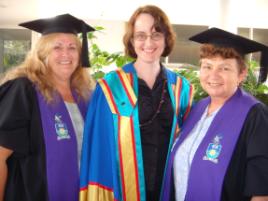CQU Bundaberg staff exponents of life-long learning
Published on 03 May, 2007
What do Australian television comedy, relative efficiencies of university business departments and learning environments used by students in a first-year university course have in common?
Not much - other than they were the subject matter of 3 thesis projects successfully completed by CQU Bundaberg staff members celebrating their graduation this week.
Graduating today are Christine Woodland, Donna Carpenter and Dr Wendy Davis.

Donna Carpenter, Dr Wendy Davis and Christine Woodland
Dr Davis, graduating with a PhD from the Faculty of Arts, Humanities and Education, critically examined Australian television comedy series including Graham Kennedy, Norman Gunston, Roy & HG and Kath and Kim.
"I was particularly interested in how comedy fits into Australian culture," said Dr Davis.
"This group of programs is really interesting as they offer up a space where we can satirise and make fun of the Australian identity - and they often do that in a live and spontaneous way."
Academic research always requires a theoretical framework, but Dr Davis was more intrigued by the programs themselves.
"Looking at programs from different eras we can see how Australian culture has changed - Norman Gunston has that cultural cringe, an embarrassing naïve kind of figure, while Kath and Kim are more brash and open and celebrate their dagginess. I see these comedies as very positive- cutting and decisive, a parody," she said.
"Whether we like it or not, television defines us as people and individuals - to dismiss it as just rubbish is quite naïve - a lot of TV can be quite banal, but even that has its points of interest - why do we watch it?
"There is something in these programs that we like, whether or not we are prepared to accept that as part of ourselves - part of the human condition. Television has lot to say about who we are and how we live our lives."
Dr Davis was inspired to follow this subject matter as a research project by the television reviews of Clive James and her personal enjoyment of Australian television comedy.
"Personal interest is vital for any kind of research - you need to want to spend years watching it and thinking and writing about it - academic work can be quite isolating," she said.
"Any type of research teaches people to think critically about the world - a generic skill that can be used in any discipline."
Dr Davis hopes to help her students develop their writing and critical thinking skills even if they have an entirely different field of interest - a sentiment shared by her colleague, Mrs Christine Woodland.
Mrs Woodland is graduating with a Masters of Business, her thesis discussing relative efficiencies of university business departments using data envelopment analysis.
Her thesis measured efficiency by examining university inputs and outputs.
"You can't look at the profitability of non-profit organisations using normal methods of return on assets because these organisations are not in there to make a profit - so it's a relative measure," she said.
Completing her research degree in 5 years - 4 of those part-time - required intensive management of lifestyle, work, academic supervisors and family.
"Sadly, the researchers' families often miss out - and you don't know till the end, till the document is submitted if it's going to be accepted - it can be very stressful," she said.
"But when it comes back and it's bound and gilt-edged it's a wonderful feeling - definitely worth it."
Mrs Woodland enjoyed gaining an appreciation of what it is to do research, think differently and critically analyse the available literature.
"You need to be completely focussed - immersed in your work," she said.
For Ms Donna Carpenter, graduating with a Master of Informatics is just the beginning of a period of celebration - she is also getting married next week.
Ms Carpenter used her first-year students as the survey group for her research, which explored the learning environments used by students in a first-year university course - where they learned and the types of resources they used.
"My research confirmed a commonly held belief that the majority of these students learned at home - not so much within classroom situation - usually by themselves, though some preferred to learn in a group," said Ms Carpenter.
She was interested to discover only about 30% used the library as a research tool.
"The sample size was small - I would need to use same instrument on a larger sample to test whether this finding applies to the general student population," she said.
"My project was good fun - especially as I had the opportunity to attend 2 international conferences in the last 18 months of the project."
All 3 graduates have had journal articles published from their research, with more in the pipeline.
Both Mrs Woodland and Ms Carpenter intend to begin work on a PhD in the future, while Dr Davis is keen to follow through by researching the phenomenon of the mockumentary.

